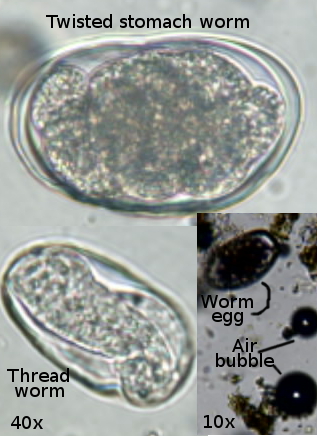
Identifying goat intestinal worms
 Good news --- finding worm eggs in a goat fecal sample
is pretty easy. Just focus on the air bubbles at 10x and look for oval
shapes on the same level that are just a little larger. Zoom in to 40x
to confirm your ID and figure out the species. Thread worm is
distinctive because you can actually see a little worm wriggling around
inside the egg, while most other eggs look more like the top picture to
the right (which I may or may not have identified correctly to species).
Good news --- finding worm eggs in a goat fecal sample
is pretty easy. Just focus on the air bubbles at 10x and look for oval
shapes on the same level that are just a little larger. Zoom in to 40x
to confirm your ID and figure out the species. Thread worm is
distinctive because you can actually see a little worm wriggling around
inside the egg, while most other eggs look more like the top picture to
the right (which I may or may not have identified correctly to species).
Bad news --- Artemesia's
worm load is indeed too high. I counted about 50 eggs on my slide,
mostly thread worm but some (probably) twisted stomach worm as well.
That count might equate to about 2,500 eggs per gram, which is higher
than is optimal.
While I'd love to stay
organic with Artemesia, I don't want to risk her health during
pregnancy. So I went ahead and treated her to a dose of Safe-guard
(fenbendazole), which is supposed to be okay for use during pregnancy. I
also changed her over to our other winter pasture since thread worms
enter a goat's system through the hooves in wet ground. Looks like that muddy spot
that offended my sense of order (and Abigail's dignity) also offends
Artemesia's health. Time to think of a solution for winter goat lounging
near the gate.
Want more in-depth information? Browse through our books.
Or explore more posts by date or by subject.
About us: Anna Hess and Mark Hamilton spent over a decade living self-sufficiently in the mountains of Virginia before moving north to start over from scratch in the foothills of Ohio. They've experimented with permaculture, no-till gardening, trailersteading, home-based microbusinesses and much more, writing about their adventures in both blogs and books.
Want to be notified when new comments are posted on this page? Click on the RSS button after you add a comment to subscribe to the comment feed, or simply check the box beside "email replies to me" while writing your comment.

Where did you get your microscope? How did you pick it out?
Those photos look too much like frogs' eggs, to me! Maybe you should draw them?
Ecological Q--Are worms in goat poop detrimental, in a garden?? What happens to those worms, in a compost pile?? do birds (chickens) have worms, too? Can you explain more about the life-cycle of worms??
Thanks!!--adrianne
Mom --- We bought the microscope to test Mark's sperm after he got his vasectomy. Yes, I am a control freak. Why do you ask?
This type of worm is an intestinal parasite. So they won't impact your garden. In a healthy compost pile, they should get outcompeted by beneficial microorganisms pretty fast. Like most parasitic worms, they're very species specific too, so they won't pass over to dogs, humans, etc.
Chickens veer more toward coccidiosis, which is caused by little critters a bit like bacteria. Goats can get this too and in either case it causes diarrhea.
In general, parasitic worms are in their adult, worm stage in the gut where they suck away your animals' blood. Their eggs get excreted in the goat pellets, then animals pick them back up when they graze on old ground. That's why pasture rotation is so essential for worm control. Unfortunately, we don't yet have enough pastures to keep our girls 100% healthy that way!
Hi Anna and Mark,
When I clicked the link I did not get a microscope that looked like yours. So adding the manufacturer and model number to the main text is probably a good idea.
I suspect that in series with my web connection are a LOT of flakey people doing all kinds of stuff. Kinda disturbing especially that the BIGGEST names are modifying search results to favor themselves and starve others.
I have been backing up some sites locally so I can see them quickly and without gross interference from these web termites.
Speaking of which, Anna and Mark it would be nice to be able to download what you have written and the accumulated comments [ which are also VERY valuable ]. One month or year at a time and keep them locally.
John